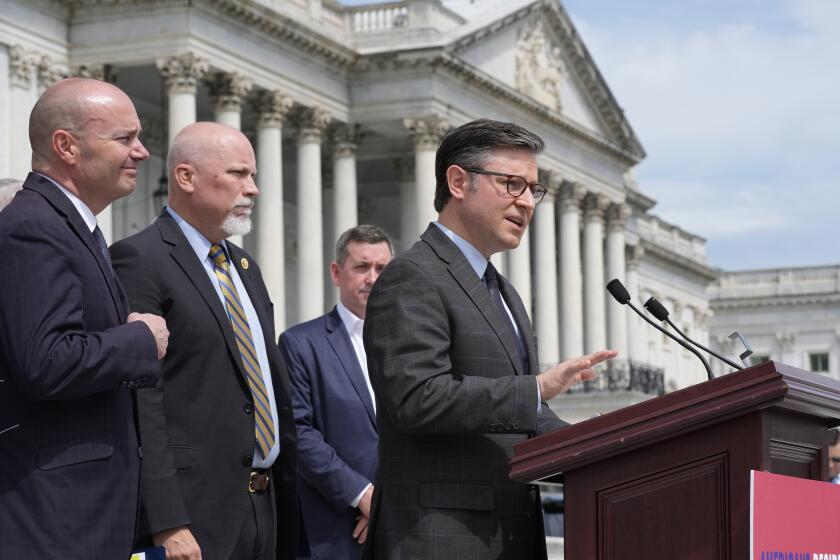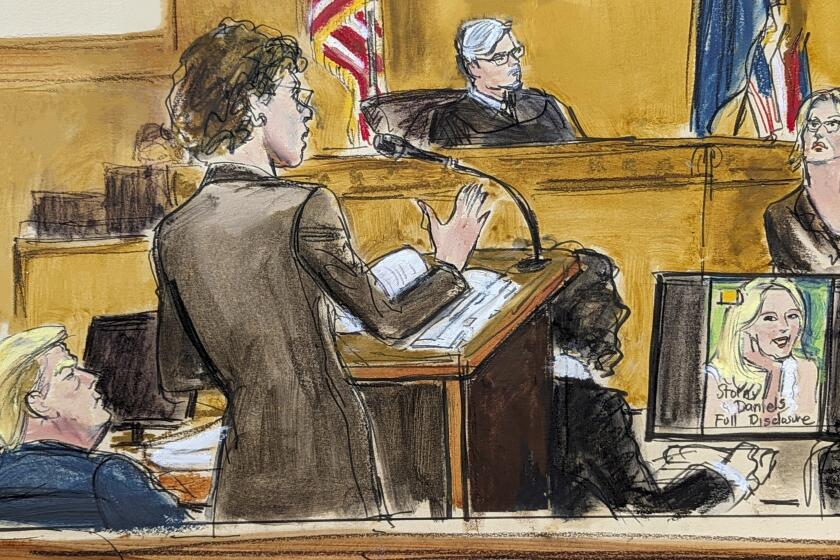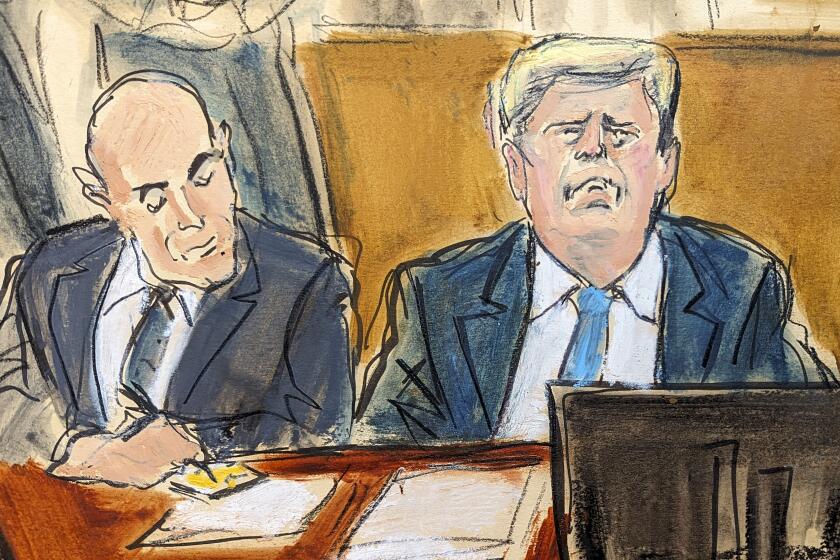Bush Offers a Feel-Good Pep Talk : President: His ‘Don’t Worry, Be Happy’ State of the Union ushers in what could be an unpleasant year between White House and Congress.
George Bush has finally made a sharp break with Ronald Reagan. Reagan, you will remember, said trees were a major cause of air pollution. In his first State of the Union address on Wednesday night, however, Bush defiantly set off on his own course. He promised “to plant a billion trees a year” in order to “help keep this country clean.” At last, Bush can say he is his own man.
As for the rest of the speech, it was in the Reagan mold--a feel-good speech. Things are fine, and we’re going to make them even finer. “Our challenge today is to take this democratic system of ours--a system second to none--and make it better,” Bush told the nation. The speech was a continuation of Bush’s 1988 campaign theme, “Don’t worry, be happy.”
Bush is a pleasant man and gives a pleasant speech. “Let all Americans . . . affirm our allegiance to this idea we call America,” he said at the end of his speech. “And let us all remember that the State of the Union depends on each and every one of us.” He might have added, “Have a nice day.”
Reagan was often stirring. Bush is pleasant. There was no call to sacrifice in Bush’s speech. This President did not summon Americans to do battle against any looming threats, like big government or the evil empire or the special interests. Why bring up such unpleasant things?
AIDS is unpleasant, so it did not get into Bush’s speech. Neither did abortion, a most unpleasant subject for the GOP these days. Unpleasant things have been happening in China, so Bush, who claims to be something of an expert on China, decided to ignore that subject too. To paraphrase a movie’s final line: “Forget it, Mr. President. It’s Chinatown.”
A State of the Union speech is supposed to be a call to action in which the President lays out an agenda. Bush refuses to do that, beyond a long list of lofty goals (“Every school in America must be drug-free”) and a short list of immediate objectives (a tax cut on capital gains). That’s one reason why Bush, with an 80% approval rating, has far less clout with Congress than Reagan had with 50%.
Congress is not afraid of Bush. They defied him a year ago on his appointment of John Tower as secretary of defense, and they defied him again last month, when 94% of the House voted to override the President’s veto of a bill to extend Chinese student visas--though the veto was upheld in the Senate. Legislators feel they can defy Bush with impunity because there is no constituency out there ready to defend the President’s program. That’s because there is no program. When Congress does give Bush what he wants--as the House of Representatives did last year on capital gains--it has to do more with the power of special interests than with Bush’s political clout.
Bush is good at the dramatic gesture. It’s his version of Reagan’s “hero-in-the-balcony” routine. “I spoke by phone with President Gorbachev, just today,” Bush said in his speech. Having gotten our attention, the President went on, “Tonight, I am announcing a major new step--for a further reduction in U.S. and Soviet manpower in Central and Eastern Europe to 195,000 on each side.”
That’s a 25% reduction in U.S. troops and a whopping 65% reduction in Soviet troops. Why would the Soviets agree to that kind of deal?
Because they are under pressure to pull even more troops out of Eastern Europe. The new governments of Poland, Czechoslovakia and Hungary have been pressuring the Soviets to start withdrawing their troops. Moreover, the United States is also under pressure to accelerate its troop cuts in Europe.
Last week’s proposal had all the characteristics of one of Bush’s dramatic gestures. First, it was highly secretive. The President was crestfallen when word of the initiative leaked out just before the speech. “I want the surprise factor,” he complained to reporters.
Second, it was preemptive. For the time being, at least, Bush stifled Democratic criticism that he was not being serious about reducing military spending.
Third, it was reactive. As Edward T. Warner, a defense analyst, explained to a reporter, “This adjustment simply reflects the unfolding realities on both sides: on the Soviet side, the pressures for large-scale troop withdrawals coming from the newly independent governments of Eastern Europe, and on the U.S. side, the pressures to reduce the defense budget.”
Bush has made some progress since his Inaugural Address. In that speech, he listed many problems facing the country--homelessness, drug abuse, crime--and said, “We have more will than wallet.” Last week, he said, “The money is there.” It’s there, the President said, for research and development, the Head Start program, the war on drugs, environmental protection and space exploration.
However, when Bush said that his 1991 budget proposal “brings federal spending under control . . . with no new taxes,” he brought down the House. At least the Republican side of the House.
In fact, the President’s budget, submitted to Congress last Monday, proposes to cut the federal budget deficit by $36.5 billion next year. Half the savings will come from cuts in domestic spending. Only one-sixth will come from defense cuts. The remaining third will come from “increased revenues.” These are not “new taxes.” They are “fee increases” and higher revenues from existing taxes--projected on the basis of extremely optimistic economic growth forecasts. Welcome back, Rosy Scenario!
So how can the President say, “The money is there”? What Bush is saying is, “It’s there for some things and not for others.” It’s there for popular programs such as Head Start and the war on drugs. It’s also there for research on trendy issues like global warming and biotechnology. But it’s not there for low-income energy assistance, farm subsidies, mass-transit programs and health care for the elderly.
The money is there for big weapons systems like the Stealth bomber, the MX missile and the Strategic Defense Initiative. Since the Administration sees no likelihood of a Soviet attack, presumably SDI will protect us from incoming Sandinista missiles. But the money is not there to prevent the closing of 21 U.S. military installations, 19 in congressional districts represented by Democrats.
After being briefed by the Administration, one GOP official summed up Bush’s budget: “They said the story of the budget can be told in two phrases: ‘kinder, gentler’ and ‘no new taxes.’ ”
In his State of the Union address, Bush observed that “remarkable events” all over the world “validate the longstanding goals of American policy--a policy based on a single, shining principle: the cause of freedom.” In his response to the President’s speech, House Speaker Thomas S. Foley (D-Wash.) called on the country “to reclaim our place in the world.” “We cannot be content to be bystanders, riders on the storm of history,” the Speaker said.
What we have here is a great irony. Bush is correct. American ideas of democracy and free enterprise are triumphing worldwide. But Foley is also correct. The United States is no longer pre-eminent in power, wealth or leadership. Our values are winning the Cold War, but we have lost our ability to control or even influence major events in the world.
Bush is fearful of making any commitments, at home or abroad, that might cost money and put pressure on him to raise taxes. But Democrats don’t have much of an agenda either. Both parties have been immobilized by the tax issue. In fact, the liveliest debate in Congress this year will be between competing tax cuts--Bush’s plan to cut the capital-gains tax, and the proposal submitted by Sen. Daniel Patrick Moynihan (D-N.Y.) to cut the Social Security payroll tax.
The 1991 budget is less than one week old, and already the following exchanges have occurred:
In a provocative essay, Budget Director Richard G. Darman described the federal budget process as a set of children’s games: “The budget as Cookie Monster; its future threatened by hidden Pac-Men; its path a journey through Wonderland.” “At some point,” Darman said to Congress, “there is an obligation to be serious.”
House Budget Committee chairman Leon E. Panetta (D-Calif.) returned the compliment, saying, “If the President is not serious about deficit reduction, why should Congress be?”
“There are two Dick Darmans,” said Rep. Charles E. Schumer (D-N.Y.). “There is Dr. Jekyll-Darman the pamphleteer and Mr. Hyde-Darman the budgeteer--and they don’t add up.”
Rep. Marty Russo (D-Ill.) offered the following enraged opinion to Darman: “I respect your talent and your ability, and that’s why it’s difficult for me, as somebody who sits with a lot of bright people on this committee, to have to admit to the American people that this budget process stinks and lies.”
Whatever the President said in his State of the Union speech, we already know one thing about his relationship with Congress this year. It will not be pleasant.
More to Read
Get the L.A. Times Politics newsletter
Deeply reported insights into legislation, politics and policy from Sacramento, Washington and beyond. In your inbox three times per week.
You may occasionally receive promotional content from the Los Angeles Times.






